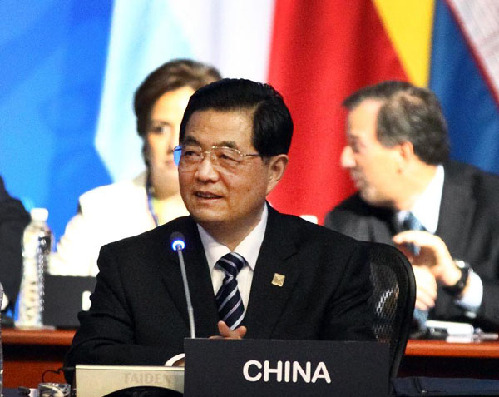Hu urges stability, development and reform at G20 summit
 0 Comment(s)
0 Comment(s) Print
Print E-mail Xinhua, June 19, 2012
E-mail Xinhua, June 19, 2012
The world's 20 leading industrialized and developing nations need to seek new progress while ensuring stability, Chinese president Hu Jintao said Monday.
 |
|
Chinese President Hu Jintao addresses the seventh Leaders' Summit of the Group of Twenty (G20) in Los Cabos, Mexico, June 18, 2012. [Xinhua] |
In a speech delivered at the G20 summit, Hu said that while there has been some improvement in growth prospects, the world economy is still facing prominent destabilizing factors and uncertainties.
New risks are emerging and building up as the underlying causes of the international financial crisis are yet to be removed, he said.
"Faced with this situation, we need to consolidate what we have achieved in countering the financial crisis, and maintain economic and social stability and development," he said. "At the same time, we should endeavor to make new progress while ensuring stability."
In a more detailed five-point proposal, the Chinese president said the G20 members should be firmly committed to promoting steady recovery of the world economy.
At present, securing growth, increasing jobs and promoting stability should still be the top priority of G20 members, Hu said, emphasizing the need for "a spirit of unity and win-win cooperation" in addressing the systemic risks in the world economy and strengthening the hard-won momentum of economic recovery.
On Europe's debt crisis, Hu said: "We should continue to support in a constructive and cooperative way the efforts of some European countries to resolve the debt issue and bring their economies back on the track of steady growth as soon as possible."
The Chinese president called for stronger macroeconomic policy coordination and sufficient attention to the national conditions and legitimate concerns of different countries.
Secondly, Hu said, the G20 members should be firmly committed to deepening the reform of the international financial system.
"The urgent task now is to implement the 2010 quota and governance reform of the IMF," Hu said, stressing the need to increase the representation and voice of developing countries, strengthen international financial supervision and regulation, improve the international monetary system, and build an international reserve currency system with stable value, rule-based issuance and manageable supply.
"Third, we should be firmly committed to promoting the healthy growth of international trade," Hu said.
Warning of the negative impact of slowing international trade growth on the world economy, Hu called for concerted efforts to foster a free, open, fair and just environment for global trade and stressed the need to oppose all forms of protectionism, keep bilateral and regional free trade arrangements open and inclusive, and uphold and strengthen the multilateral trading regime.
In addition, G20 countries need to pay attention to the issue of value chain in international trade, and should also look at the so-called "trade imbalance" in a more objective and sensible way, he said.
Fourth, Hu said G20 members should be firmly committed to promoting development.
"We should pay attention to the spillover effect of relevant countries' crisis response policies and measures on developing countries, and encourage the international community to take concrete steps and deliver tangible results in promoting the prosperity and progress of developing countries and narrowing the North-South gap," the Chinese president said.
He also called on the G20 to step up cooperation with the United Nations, and to enhance the function of international financial institutions in promoting development and reducing poverty.
"We should give developing countries more support in conducting external trade," he said.
And fifth, G20 countries should be firmly committed to advocating sustainable development.
"Green growth is an important means to ease resource and environmental constraints and achieve sustainable economic development," he said.
He urged G20 members to actively develop green industries such as energy conservation and environmental protection, increase financial and institutional support for them, and build a resource-conserving and an environment-friendly society.
Stressing the importance of adhering to the principle of common but differentiated responsibilities, Hu said efforts should be made to take into full account the differences among countries in terms of resources endowment, stage of development and capacity for developing green industries, and support the independent choice of a path of sustainable development that suits each country's conditions.
The two-day G20 summit, which is hosted by Mexcian President Felipe Calderon, began in the Mexican resort of Los Cabos earlier in the day.
At the meeting, G20 leaders will exchange views on the global economic situation, the strengthening of the financial system, development, trade and employment.
The G20 summit is being convened at a time when the global economy is facing great risks to growth and stability. The prolonged eurozone debt crisis, slowdowns in major developed nations and even in emerging economies, and high unemployment in parts of the world are all posing threats to the fragile recovery.






Go to Forum >>0 Comment(s)